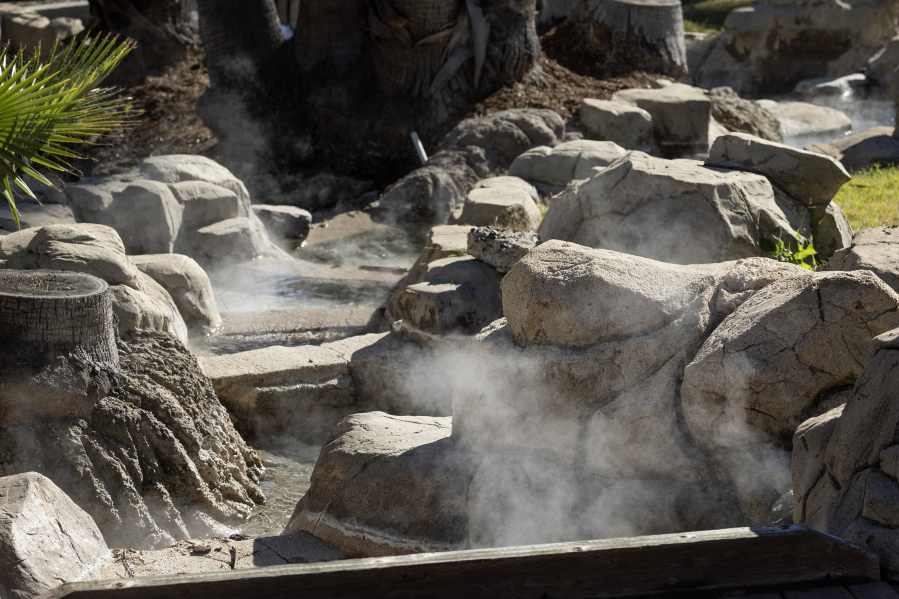Murrieta Hot Springs, a palm-shaded haven of steaming streams and coveted mud just north of Temecula, Calif., has been home to a Christian Bible college, a TV-free vegetarian commune and a popular mostly Jewish resort. Now comes a new chapter that will open the grounds and waters to the public for the first time in nearly 30 years.
On Feb. 1, the property will open as a wellness resort and hotel, offering spa services, all sorts of soaking, 174 hotel rooms and several buildings that date back to the early 20th century. The room rates will start at $399, day passes at $89 per adult.
From 1995 until 2022, the property housed the Calvary Chapel Bible College and Conference Center, which was closed to the public and made only limited use of the waters that bubble up from below. (The bathhouse was converted into a library.)
About two years ago, the Texas-based Olympus Real Estate Group laid out $50 million for the property, then set about spending another $50 million to rethink and restore the campus.
Now the 46-acre site, which includes several historic buildings, is all about water again. The resort includes more than 50 pools, tubs and other water features, including a lake that served as hub of the compound.
The bathhouse is once again a bathhouse. It neighbors the resort’s Spanish Revival stone lodge, which dates to 1926, and the Spanish-style Monterrey Building, which went up incrementally between 1915 and 1925. Most of the guest rooms date to the 1960s and have been redone in a minimalist style with muted tones.
The property also includes the casual Cafe Azuli, Brew 1902 coffee shop, a Dynamic Fitness center, gazebo and lounge bars, a mud loft (with clay trucked in from the Mojave Desert) and a sauna with panoramic views. A signature upscale restaurant, Talia Kitchen, is due to open in spring. A wine bar, Novel, is due to open later in the year.
The resort’s waters — which visitors drank in its early years — are said to include sulfate, chloride, boron, calcium, lithium, potassium, sodium, silica and bicarbonate.
“Our water comes out of the ground at about 125 to 130 degrees, depending,” said Dr. Marcus Coplin, the resort’s medical director, noting that the water is cooled to 104 degrees or less before guests bathe. The property also includes several cold-plunge pools whose water is 54 degrees or less. According to the resort’s promotional materials, the waters “enhance circulation, reduce inflammation, uplift mood, and support cellular health.”
“Without being clinical,” Coplin said during a pre-opening tour, “we want to create a data-informed, science-informed approach to health and wellness.”
The springs first gained popularity as a commercial venture in 1902 under the ownership of German immigrant Fritz Guenther. In 1911, the minor league Los Angeles Angels held their spring training at the hot springs.
Over time, a hotel and other amenities grew, including live music and miniature golf. In a video produced by members of Calvary Chapel, Guenther family members and other longtime locals recalled that the resort was especially popular among Jewish families, perhaps because they were familiar with European traditions of communal bathing.
The Jewish Museum of the American West has called Murrieta “the Catskills of Southern California,” describing it as a favorite spot of Jewish families in the first half of the 20th century, when many of its Spanish Revival buildings were decorated with six-sided stars.
In the late 1960s, the Guenther family sold the resort (then 500 acres) to San Diego attorney Irving Kahn, a transaction that led to an era of widely varied and sometimes controversial uses, including a cancer clinic whose alternative therapies were publicly discredited.
In the 1980s, a New Age health group called Alive Polarity bought the resort and operated it for several years as a vegetarian community free of alcohol, tobacco, television and telephones. Later came a bar called Shakespeare’s Pub.
By 1990s, when Calvary Chapel of Costa Mesa bought it, the core property has been reduced to less than 50 acres, much of which had fallen into dilapidation.
The church renovated the property as a college and conference center for other megachurches, a formula that worked well until enrollment fell and the onset of the pandemic put public gatherings on hold. The Bible college has relocated to Twin Peaks in the San Bernardino Mountains.
For the Olympus Real Estate Group’s managing director, David Dronet, Murrieta is the second step in a strategic campaign that began with the 2018 purchase of The Springs Resort in Pagosa Springs, Colo., another geothermally active, wellness-emphasizing hospitality business. To manage Murrieta, Olympus has hired Remington Hospitality, which runs scores of lodgings and restaurants nationwide.



